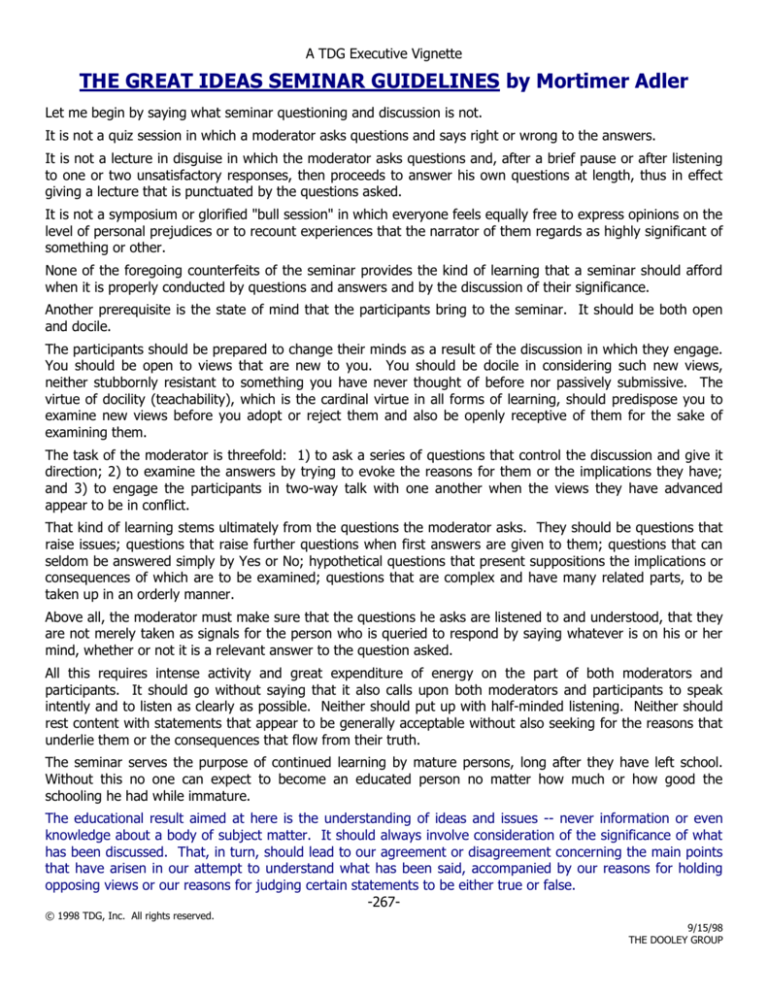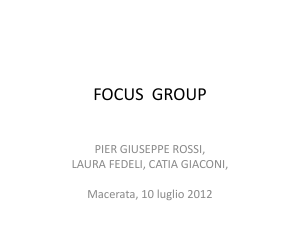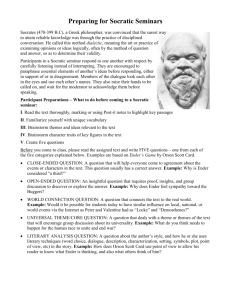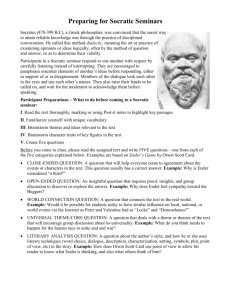
A TDG Executive Vignette
THE GREAT IDEAS SEMINAR GUIDELINES by Mortimer Adler
Let me begin by saying what seminar questioning and discussion is not.
It is not a quiz session in which a moderator asks questions and says right or wrong to the answers.
It is not a lecture in disguise in which the moderator asks questions and, after a brief pause or after listening
to one or two unsatisfactory responses, then proceeds to answer his own questions at length, thus in effect
giving a lecture that is punctuated by the questions asked.
It is not a symposium or glorified "bull session" in which everyone feels equally free to express opinions on the
level of personal prejudices or to recount experiences that the narrator of them regards as highly significant of
something or other.
None of the foregoing counterfeits of the seminar provides the kind of learning that a seminar should afford
when it is properly conducted by questions and answers and by the discussion of their significance.
Another prerequisite is the state of mind that the participants bring to the seminar. It should be both open
and docile.
The participants should be prepared to change their minds as a result of the discussion in which they engage.
You should be open to views that are new to you. You should be docile in considering such new views,
neither stubbornly resistant to something you have never thought of before nor passively submissive. The
virtue of docility (teachability), which is the cardinal virtue in all forms of learning, should predispose you to
examine new views before you adopt or reject them and also be openly receptive of them for the sake of
examining them.
The task of the moderator is threefold: 1) to ask a series of questions that control the discussion and give it
direction; 2) to examine the answers by trying to evoke the reasons for them or the implications they have;
and 3) to engage the participants in two-way talk with one another when the views they have advanced
appear to be in conflict.
That kind of learning stems ultimately from the questions the moderator asks. They should be questions that
raise issues; questions that raise further questions when first answers are given to them; questions that can
seldom be answered simply by Yes or No; hypothetical questions that present suppositions the implications or
consequences of which are to be examined; questions that are complex and have many related parts, to be
taken up in an orderly manner.
Above all, the moderator must make sure that the questions he asks are listened to and understood, that they
are not merely taken as signals for the person who is queried to respond by saying whatever is on his or her
mind, whether or not it is a relevant answer to the question asked.
All this requires intense activity and great expenditure of energy on the part of both moderators and
participants. It should go without saying that it also calls upon both moderators and participants to speak
intently and to listen as clearly as possible. Neither should put up with half-minded listening. Neither should
rest content with statements that appear to be generally acceptable without also seeking for the reasons that
underlie them or the consequences that flow from their truth.
The seminar serves the purpose of continued learning by mature persons, long after they have left school.
Without this no one can expect to become an educated person no matter how much or how good the
schooling he had while immature.
The educational result aimed at here is the understanding of ideas and issues -- never information or even
knowledge about a body of subject matter. It should always involve consideration of the significance of what
has been discussed. That, in turn, should lead to our agreement or disagreement concerning the main points
that have arisen in our attempt to understand what has been said, accompanied by our reasons for holding
opposing views or our reasons for judging certain statements to be either true or false.
-267© 1998 TDG, Inc. All rights reserved.
9/15/98
THE DOOLEY GROUP










